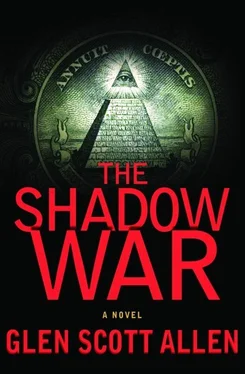Glen Allen - The shadow war
Здесь есть возможность читать онлайн «Glen Allen - The shadow war» весь текст электронной книги совершенно бесплатно (целиком полную версию без сокращений). В некоторых случаях можно слушать аудио, скачать через торрент в формате fb2 и присутствует краткое содержание. Жанр: Триллер, на английском языке. Описание произведения, (предисловие) а так же отзывы посетителей доступны на портале библиотеки ЛибКат.
- Название:The shadow war
- Автор:
- Жанр:
- Год:неизвестен
- ISBN:нет данных
- Рейтинг книги:5 / 5. Голосов: 1
-
Избранное:Добавить в избранное
- Отзывы:
-
Ваша оценка:
- 100
- 1
- 2
- 3
- 4
- 5
The shadow war: краткое содержание, описание и аннотация
Предлагаем к чтению аннотацию, описание, краткое содержание или предисловие (зависит от того, что написал сам автор книги «The shadow war»). Если вы не нашли необходимую информацию о книге — напишите в комментариях, мы постараемся отыскать её.
The shadow war — читать онлайн бесплатно полную книгу (весь текст) целиком
Ниже представлен текст книги, разбитый по страницам. Система сохранения места последней прочитанной страницы, позволяет с удобством читать онлайн бесплатно книгу «The shadow war», без необходимости каждый раз заново искать на чём Вы остановились. Поставьте закладку, и сможете в любой момент перейти на страницу, на которой закончили чтение.
Интервал:
Закладка:
"A statue of whom, I wonder," said Wolfe.
Seaton smiled. "At the time the house was built, I believe it was Socrates. Now it's a very bad imitation of Rockefeller's Aphrodite. But it hasn't roused nearly the controversy here it did for him in 1905."
Seaton pointed to the chairs and couch in front of the fireplace. "Here, please gentlemen, sit down."
Even as Seaton invited them to take seats, the downpour that had been holding back outside let go. There was a series of terrific flashes of lightning and, a few seconds later, peals of thunder. Rain came lashing against the panes of the tall bay window, washing down in waves across the glass.
"Looks like you got here just before the deluge," said Seaton. Again, he motioned toward the chairs and couch set before the fireplace.
The three of them moved to the chairs, Benjamin and Wolfe taking their seats on the silk-covered couch, and Seaton sitting in the rightmost wingback chair. "Can I get you anything to drink?" he asked. "Coffee? Bloody Mary? Mimosa?"
"Well… no thank you," said Wolfe, catching a look of surprise from Benjamin.
"This house may date to the Puritans," said Seaton, smiling broadly, "but believe me, we dispensed with their prohibitions a long time ago."
Wolfe leaned back and fixed Seaton with what Benjamin recognized as one of his supercilious stares.
"Just how old is this house, Mr. Morris?" he asked.
"Well." Seaton leaned back, looked about as though taking in the room for the first time. "Actually, it's not the site of the first Morris estate. As I imagine Arthur has told you, that distinction belongs to the Foundation. The manse, as I believe they call it?" Wolfe nodded. "That was the original ancestral hall of the Morris family."
Benjamin leaned forward. "But wasn't that Henry Coddington's estate first?"
Seaton laughed. If Benjamin's comment had discomfited him, he didn't reveal it.
"Yes, that's right. Poor old Coddington put his eggs in the wrong basket, I'm afraid. And paid the price. His entire estate was awarded to Gouverneur Morris in recognition of all his work on behalf of the new American nation."
"Then how-?" began Wolfe.
"Did we wind up in here?" finished Seaton. "There was a great deal of millennial activity after the war. You know the sort of thing, utopian societies, eager to expand on the ideal of the new America; or in some cases I suppose convinced it wasn't ideal enough. Anyway, one of Gouverneur's daughters-Rebecca Morris-became involved with one of them. It was called New Cairo, or New Egypt, something exotic like that. When she died, childless, she bequeathed the property and everything on it to the group, and so it passed out of the family holdings, and we were forced into this more… humble abode. The old manse has had a great many incarnations since then, as I'm sure Arthur informed you." Seaton smiled. "But you're not here for the family history lecture, are you. What you're interested in is over there."
He rose and walked to one of the display cases in the middle of the room, and Benjamin and Wolfe followed him. He led them to the middle of the case.
"The Bainbridge diary," he said, softly touching the rounded dome of glass.
Beneath his hand and a thick layer of glass, and supported on a wooden bookstand, was a book a little over a foot high and perhaps almost as wide. Open as it was, the cover wasn't visible.
What was visible was the first page of the book. Its edges were blackened with age, and the paper appeared to have been damaged in spots by damp and mold. Age had also faded some of the black ink lettering on the page, which was written in a careful, flowing script.
As Benjamin and Wolfe gazed down at it, Seaton asked, "Do you know the story?"
Benjamin started to nod, but Wolfe said rather abruptly, "No, not all of it. Would you mind?"
"Not at all," Seaton said. "It's fascinating."
"The Foundation, and before that the Coddington Estate, stands on the grounds of what was, in the 1600s, something called the Bainbridge Plantation. It was one of those religious communities-from what I've been told, Harlan Bainbridge, the founder, was something of a fanatic, a thorn in the side of the other Puritans. So, like Moses-or I guess Brigham Young and his Mormons-Harlan led his followers out into the wilderness. Back then, that was anything west of Deerfield, I guess. And they built a compound. It was extraordinary, really. But then the entire camp was wiped out by Indians-"
"In 1675," interrupted Benjamin. "By Wampanoags." He was looking at Seaton, not the diary. "Or so the story goes."
Seaton returned the look. "Yes," he said. "Exactly. It was tragic. Not a soul survived."
Seaton looked back down at the diary. "Anyway, after the Indian 'troubles' were settled, Coddington built his estate there-apparently he had provided some sort of financial support to Bainbridge's group, and the deed was in his name. He built the main house that's still there, what they call the manse, and the family lived there for a hundred years. Until my ancestors came into the site after the Revolutionary War. But nothing much was really known about the Bainbridge Plantation, as it was apparently called, after their extermination." He looked up at them again.
"The Morris family also inherited the Indians' displeasure with the 'White Man's' presence," he continued. "Seems there was a sacred burial ground nearby. They continued to agitate about it, bothered the commune when they were there, and the women's institute after them. Never let up, really. Until finally there were no official Wampanoags left to complain."
"And how exactly-" Wolfe pointed to the diary.
"Oh, yes. Well, as you know, the Foundation-though it was called the Heritage Institute for Good Government back then-was officially established there by the 1920s. They undertook some excavation to expand the main building. Imagine their surprise when they encountered a tiny, buried crypt, and inside the crypt a box, and inside that box," he pointed, "this book."
There was a short silence as all three of them contemplated the diary. Benjamin thought it seemed completely indifferent to their scrutiny: ancient, weary, eternal.
Seaton leaned over the case and began reading out loud the carefully inked lines weaving across the dull, yellowed page: "And the kings of the earth, and the great men, and the rich men, and the chief captains, and the mighty men, and every bondman, and every free man, hid themselves in the dens and in the rocks of the mountains; and said to the mountains and rocks, Fall on us, and hide us from the face of him that sitteth on the throne and from the wrath of the Lamb; for the great day of his wrath is come; and who shall be able to stand?"
Seaton looked back up at them. "It's from Revelation-," he began.
"Six fifteen," said Benjamin. He looked up at Seaton. "I remember because it begins with the lines everyone always quotes from Revelation. You know." And he recited, still staring directly at Seaton. "And I beheld when he had opened the sixth seal, and lo, there was a great earthquake, and the sun was as black as sackcloth of hair, and the moon was like blood."
"Well, yes," Seaton said. "But of course it's also written there, at the bottom of the quote."
Just beneath the block of text, in the same flowing, faded script, was a single line.
R 6:12-HPB
Seaton paused, looked at Benjamin. "R 6:12. Revelation six, verse twelve. And the HPB is, of course…"
"Harlan Phlegon Bainbridge," finished Benjamin.
"Of course," echoed Wolfe. Then he hurried on. "And exactly when was it your family obtained the diary from the Foundation?"
"Some time later," said Seaton. "They felt we had the resources necessary to preserve a treasure like this. And fortunately it was one of those that survived the fire."
Читать дальшеИнтервал:
Закладка:
Похожие книги на «The shadow war»
Представляем Вашему вниманию похожие книги на «The shadow war» списком для выбора. Мы отобрали схожую по названию и смыслу литературу в надежде предоставить читателям больше вариантов отыскать новые, интересные, ещё непрочитанные произведения.
Обсуждение, отзывы о книге «The shadow war» и просто собственные мнения читателей. Оставьте ваши комментарии, напишите, что Вы думаете о произведении, его смысле или главных героях. Укажите что конкретно понравилось, а что нет, и почему Вы так считаете.












